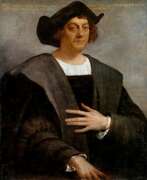Naturalists 15th century


Christopher Columbus (Spanish: Cristóbal Colón, Latin: Christophorus Columbus, Italian: Cristoforo Colombo) was a medieval Spanish navigator of Italian origin who discovered the New World in 1492.
About the exact origin of Columbus scientists argue to this day. He already from his youth had a brilliant knowledge of mathematics, knew several languages, including Latin. Columbus was familiar with the teachings of ancient Greek philosophers and thinkers who depicted the Earth as a sphere, not flat, as was believed in the Middle Ages. Christopher was also trained in the art of navigation and made his first voyages as a young man in the Mediterranean Sea, later sailing to Africa and participating in a northern expedition through the British Isles and Iceland.
Gaining experience, studying geography and maps, Columbus assumed that it was possible to reach India by the western route. He sought financial support from European monarchs, but only the Spanish monarch was interested in the prospects. He agreed and borrowed money to outfit a squadron of ships to find a western route to India.
Christopher Columbus made four historic voyages to the shores of America: August 3, 1492 - March 15, 1493; September 25, 1493 - June 11, 1496; May 30, 1498 - November 25, 1500 and May 9, 1502 - November 7, 1504. Expeditions of Columbus for the first time made information about the lands in the west common knowledge and began the colonization of America by Europeans. But the discoverer of new lands to the end of his life was convinced that he had discovered the richest Western India.
From the last expedition Columbus returned to Spain terminally ill, his last money he spent to pay debts to its participants. Two years later, the discoverer of the New World died in poverty in a small house. Columbus's discoveries, accompanied by the colonization of land, the establishment of Spanish settlements, enslavement and mass extermination of the indigenous population, which he called Indians, were of world significance.